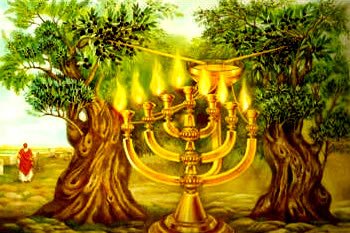by Larry Short
I shared recently during worship that one of my favorite chapters in the Bible is Zechariah 4. In this chapter, the prophet is sharing a fifth out of eight visions. All occurred on the same amazing, exhausting night.

Zechariah’s fifth vision was of an object which would have been familiar to him as a priest—a menorah, or seven-branched candelabra. But this was a menorah on steroids! It was made of pure gold and had pipes to each of the seven lamps running from a reservoir on top, which was connected by two larger golden pipes, one to each of two olive trees that stood by it on each side.
The trees were delivering a constant, organic flow of golden olive oil to the lamps.
This vision was highly unusual in light of the normal duties of priests in the Temple. They were responsible to tend the golden menorah: to trim its wicks and to refill its bowls with a continuous supply of olive oil. The menorah in the Temple was to burn brightly, 24 hours a day, so this lamp-tending duty was a constant and highly important responsibility of the priests.
But here, in Zechariah’s vision, was a menorah that tended itself! No priest had to intervene to keep it burning brightly.
Zechariah was baffled by this vision. He asked the angel who had awoken him “from a deep sleep” to show him the vision, “What are these, sir?” The angel replied, “Don’t you know what these are?” I like Zechariah’s humble response, “No, sir.” (God help me to respond likewise when I don’t know the answer to a question!)
Therefore, the angel told him, “These signify the word of the Lord to Zerubbabel: ‘Not by strength and not by power, but by my Spirit,’ says the Lord who rules over all.”
Zerubbabel was a political leader of Israel who, along with its religious leader, Joshua, had been responsible 14 years earlier for leading a contingent of 42,000 Jews across the desert to reclaim Jerusalem after Israel’s 70-year captivity in Babylon ended. The project (to rebuild Jerusalem’s walls and the Temple) had a great start, with the foundation being laid, but then it faltered due to internal dissent and external threats. The prophet Haggai, a contemporary of Zechariah’s, reveals that the Jews had become concerned only with rebuilding their own houses instead. They had grown complacent and given up on the vision.
The menorah symbolized Israel’s duty to be a light to the world. God had called Israel to show His glory to the Gentile nations, but instead they descended into comfort and complacency and considered Gentiles only as fuel to keep the fires of hell hot.
When Zechariah uses the Hebrew word translated “strength” in 4:6, it refers to resources we might wield, such as armies. When he uses the word “power,” it refers to our personal will or drive to make things happen.
This chapter reveals very clearly that God’s agenda for us is not to “make things happen” for His glory in our own strength and power, but rather to serve as channels, or conduits, for the flow of His power (symbolized by olive oil).
While Zechariah knew what a menorah was, he didn’t understand exactly what he was seeing, and he asked the angel for help grasping the meaning of the two olives trees and the pipes that carried their oil to the lamps. The angel said the trees were “the two anointed ones who stand by the Lord of the whole earth.”
The immediate application was clearly referring to Zerubbabel and Joshua, the two God had chosen to complete the task of restoring Jerusalem. But a more future, prophetic application looks forward to the “two witnesses” of Revelation, where a menorah representing the seven churches of Asia Minor also appears. These churches are tasked with shining God’s light into a dark, end-times society, and the two witnesses were the conduits through whom the power of the Holy Spirit would flow to make it happen.
Oil in Scripture always represents the Holy Spirit: it lubricates (removes obstacles and makes things happen); it burns brightly (glorifies God passionately); it heals; it anoints; and it offers a sweet-smelling fragrance (representing the prayers of the saints) to the heavenly throne.
The truth is, nothing that matters happens aside from the power of the Holy Spirit. All our frenetic activities yield only temporary results. Jesus said: “I am the vine, you are the branches.” His power must flow through us (if we “abide in,” or remain connected to, Him) and into the fruit (if we seek through open hands to serve and bless others).
Jesus often spoke of the Holy Spirit as a gift who is ours for the asking. Through prayer we must acknowledge that we are impotent to make anything of true and lasting importance happen. Instead, we must seek to become vessels of God’s Holy Spirit.
Hence, I have made Zechariah 4:6 my life verse, to remind me of these truths. For my natural tendency is to push, like Sisyphus, the rock uphill to try and make things happen, only to find myself sliding back to where I began.
Only through God’s power can we see obstacles removed, people healed, our lips and hands anointed, our prayers ascending like sweet incense to the throne of God, and the light shone into the darkness. Do you begin each day asking for God’s Holy Spirit to anoint you and make your efforts of lasting import, for His sake and glory and not your own?
*****
Larry shares these words and more about personal transformation on his new blog, ShortChanged.
Views – 283

 Follow
Follow